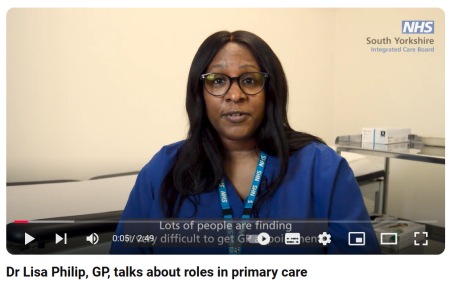
A South Yorkshire GP is reminding patients of the different healthcare professional working in GP practices and how they can help you get the right care in a timely manner.
Dr Lisa Philip is a GP in Sheffield, and partner member on NHS South Yorkshire’s Board. In a new video from NHS South Yorkshire, Dr Philip explains about the various roles in your GP practice and, how each one can help in reducing the pressures on services and the waiting times for patients.
The services provided by your GP practice has changed over the years, there are now more expert roles than ever in GP practices, ensuring that patients are seen by the most appropriate professional.
Dr Philip said: “We know that lots of people find it difficult to get GP appointments, particularly at this time of year. Fortunately, we have a wide range of highly trained and specialised staff working in GP practices who can help you quickly and efficiently, you don’t always need to see a GP.
“For example, if you have a bad back or issues with your joints, we have physiotherapists working in practice who you can see without having to see your GP first. Physiotherapists are highly trained in dealing with issues with muscles and bones and are the best person for you to see.
“In the past, you would have had to see a GP to get a referral to a physiotherapist in a hospital, now we have them working in practice you can book an appointment with them directly, cutting out the middle man and meaning you will be seen more quickly.”
Other roles in GP practices include practices nurses who are able to diagnose and treat a wide range of illnesses and conditions, some nurses are also able to prescribe medication when needed. You may be offered an appointment with a nurse to discuss and manage long term conditions such as diabetes and asthma – nurses are highly qualified and have extensive experience in supporting patients with long term conditions as well as common ailments.
Dr Philip added: “When you call to make an appointment, our receptionists, sometimes called care navigators, will ask you why you are calling. They aren’t doing this to be nosey, they need to take this information so they can book you an appointment with the right healthcare professional. It may be that you do need to speak to a GP, in this case you will be offered a telephone or in person appointment, depending on your condition. If a GP isn’t the most appropriate person to see, the care navigator will explain who they are booking you an appointment with.”
The Pharmacy First scheme was launched by the government and NHS England earlier this year to give patients quick and accessible care and ease pressure on GP services. Pharmacy First enables community pharmacists to supply prescription-only medicines, including antibiotics and antivirals where clinically appropriate, to treat seven common health conditions without the need to visit a GP.
Dr Philip, said: “Pharmacists are highly trained health care professional who are able to assess, diagnose and treat a range of common conditions and ailments. If you or your child are experiencing a minor condition, rather than waiting for a GP appointment, you can attend your local pharmacy, without an appointment, and be seen there and then.”
You can watch Lisa's video below: